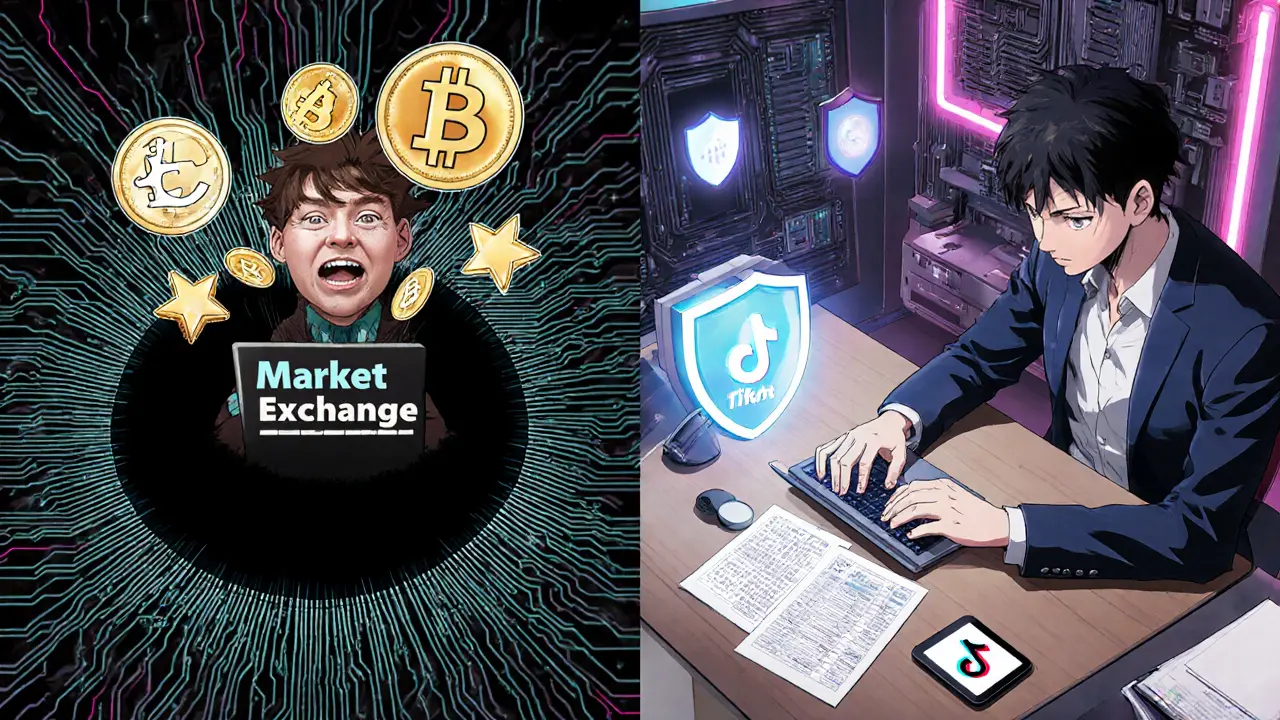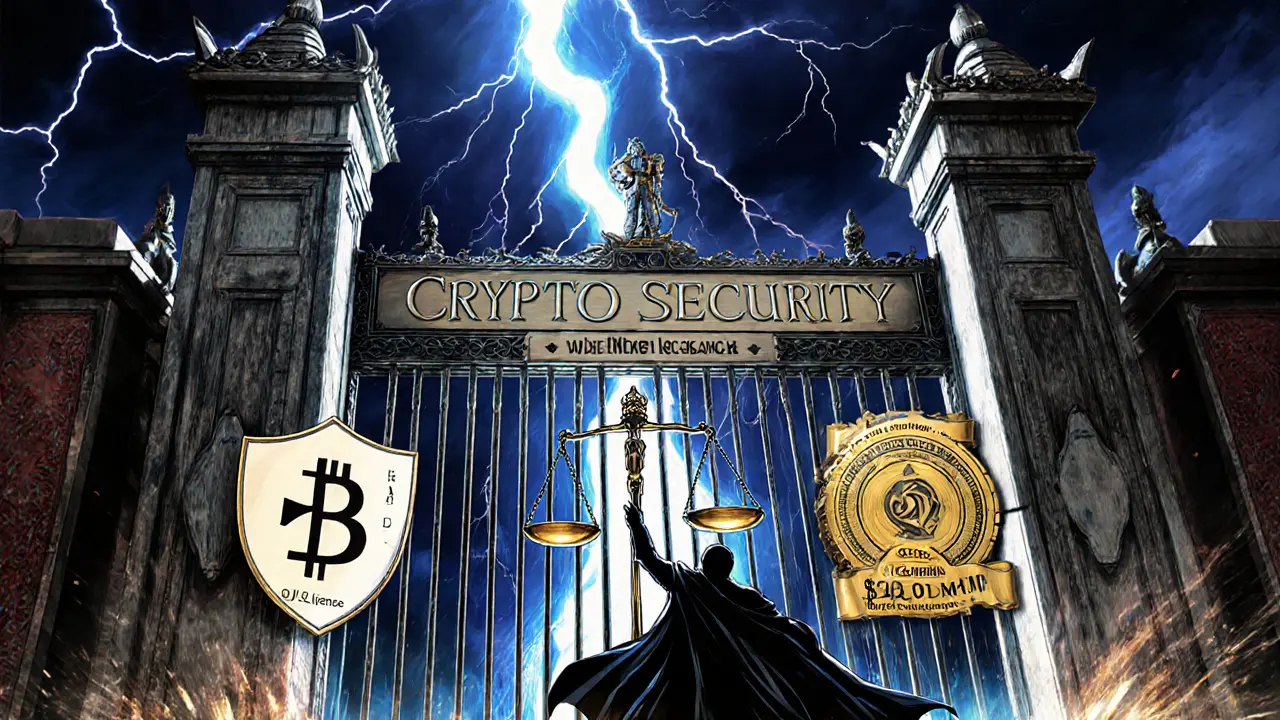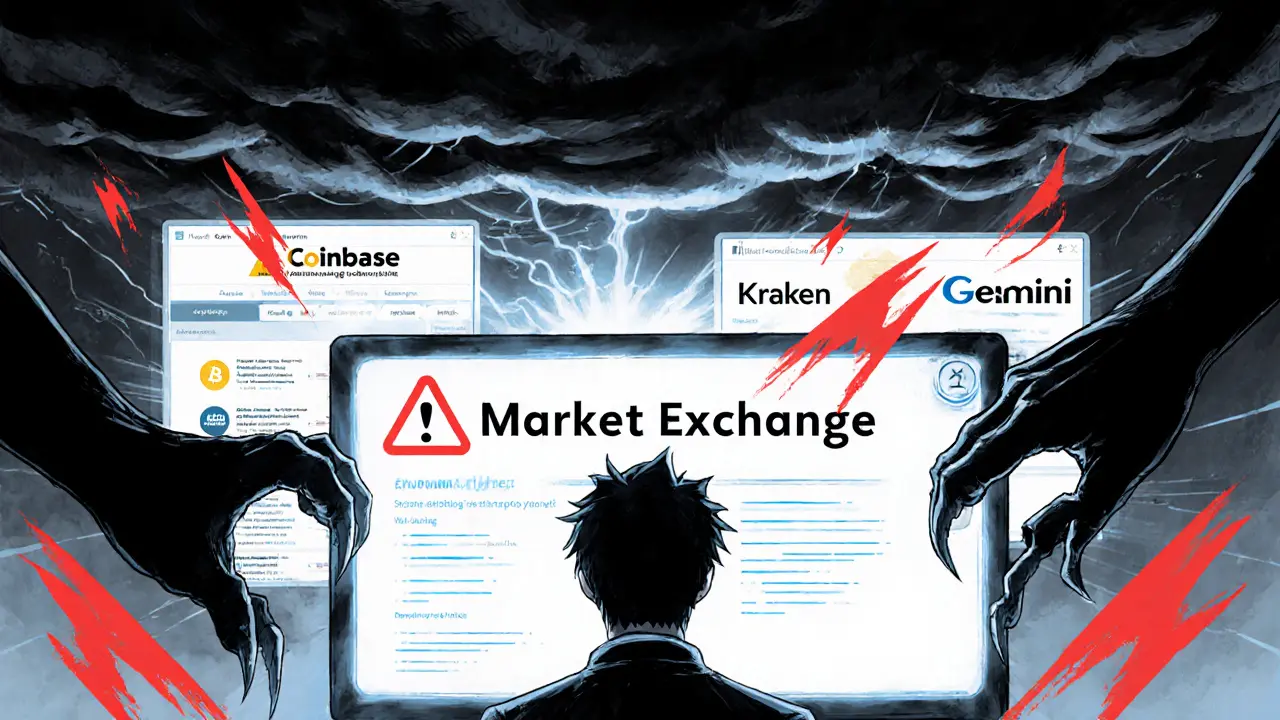Crypto Exchange Verifier
Verify Exchange Security
Check if an exchange meets minimum security standards based on the 5 non-negotiable criteria from the article.
When you're looking to buy, sell, or trade cryptocurrency, your choice of exchange can make or break your experience. Not all crypto exchanges are created equal. Some are easy to use but charge high fees. Others have low fees but confusing interfaces. Some keep your funds safe with industry-leading security. Others have been hacked or frozen accounts without warning. If you're asking, "Is Market Exchange a good crypto exchange?" - you're not alone. But here’s the truth: Market Exchange doesn't exist as a major, regulated platform in 2025. There's no verified exchange by that name on CoinGecko, CoinMarketCap, or any official regulatory database like the U.S. FinCEN or UK FCA. It’s likely a fake, scam site, or a misleading brand name used by phishing platforms.
Why "Market Exchange" Is a Red Flag
If you’ve seen ads for "Market Exchange" promising low fees, instant withdrawals, or high-yield staking, tread carefully. In 2025, the number of crypto scam exchanges has risen 47% compared to 2024, according to Chainalysis’ Q3 Fraud Report. These platforms often copy the look and feel of real exchanges like Coinbase or Kraken, using similar logos, domain names, and even fake Trustpilot reviews. They lure users with promises of "exclusive access" or "limited-time bonuses," then disappear after you deposit funds.Real exchanges don’t need to advertise on TikTok or Instagram with influencers promising 500% returns. They build trust through transparency, regulatory licenses, and public audits. For example, Kraken publishes monthly proof-of-reserves. Coinbase is licensed in all 50 U.S. states. Binance US operates under strict SEC oversight. Market Exchange? No public license. No audit reports. No customer support phone number. That’s not a feature - it’s a warning.
What a Legit Crypto Exchange Should Have
Before you trust any platform with your money, check for these five non-negotiables:- Regulatory licensing - Look for MTL (Money Transmitter License) in the U.S., FCA in the UK, or MiCA compliance in the EU. Coinbase, Kraken, and Gemini all list their licenses on their websites.
- Proof-of-reserves - Monthly third-party audits showing they hold 100% of customer funds. Kraken has done this since 2013. Market Exchange? Nothing.
- Cold storage - Over 95% of assets stored offline. Coinbase keeps 98% in cold storage. If an exchange doesn’t say how much they store offline, assume it’s all online - and at risk.
- Two-factor authentication (2FA) - Mandatory, not optional. All major exchanges require it. Scam sites often skip this to make sign-up "faster."
- Real customer support - Live chat, email, and phone support with average response times under 24 hours. Kraken’s support team resolves 89% of tickets in under 12 hours. Market Exchange? No contact info listed.
Real Alternatives to "Market Exchange" in 2025
If you’re looking for a trustworthy exchange, here are the top three used by real traders in 2025:| Exchange | Cryptocurrencies | Trading Fees | Best For | Security Rating |
|---|---|---|---|---|
| Coinbase | 235 | 0%-3.99% | Beginners, fiat on-ramps | 9.6/10 |
| Kraken | 350+ | 0%-0.4% | Advanced traders, low fees | 9.5/10 |
| Gemini | 73 | 0.5%-3.49% | Regulatory compliance, institutional use | 9.3/10 |
Coinbase is the easiest to start with. You can link your bank account, buy Bitcoin in under five minutes, and use their free Coinbase Academy to learn trading basics. Kraken is better if you trade often - their maker-taker fee structure rewards volume traders. Gemini is the safest for large deposits, with insurance up to $200 million and full SEC compliance.

How to Spot a Crypto Exchange Scam
Here are five signs you’re dealing with a fake exchange:- No domain history - Check Whois. If the domain was registered last month, walk away.
- Unrealistic rewards - "Earn 10% daily on your crypto"? That’s not investing - it’s a Ponzi scheme.
- No public team - Legit exchanges list founders, CTOs, compliance officers. Scams hide behind "anonymous developers."
- Only crypto deposits - Real exchanges let you deposit USD, EUR, or GBP via bank transfer. Scams only accept crypto - so they can vanish with your funds.
- No app store presence - Coinbase and Kraken are on Apple App Store and Google Play. Fake exchanges only have web links. If you can’t find it in the App Store, it’s not real.
What Happens If You Get Scammed?
If you’ve already sent funds to "Market Exchange" or a similar platform, act fast:- Stop sending more money - scammers often pressure you to "double down" to "unlock" your funds.
- Report it to the FTC at reportfraud.ftc.gov (even if you’re outside the U.S.).
- File a report with IC3 (Internet Crime Complaint Center) at ic3.gov.
- Alert your bank - they may be able to reverse a recent wire transfer.
- Never pay a "recovery service" - 99% of those are second-layer scams.
Recovery is rare. The FBI estimates less than 5% of crypto scam victims recover any funds. Prevention is the only real strategy.

Final Advice: Stick to the Big Names
In 2025, the crypto exchange market is more regulated than ever. The top platforms have spent millions on compliance, security, and customer trust. You don’t need to chase the next big thing. You need to protect your money.Use Coinbase if you’re new. Use Kraken if you’re serious about trading. Use Gemini if you’re holding large amounts. Avoid anything with no name, no license, and no track record. "Market Exchange" isn’t just unknown - it’s dangerous. Don’t risk your crypto on a name you can’t verify.
Is Market Exchange a real crypto exchange?
No, Market Exchange is not a real or regulated cryptocurrency exchange. It does not appear on any official lists from CoinGecko, CoinMarketCap, or U.S. financial regulators. It’s likely a scam site designed to steal user funds. Always verify an exchange through official regulatory databases before depositing money.
What are the safest crypto exchanges in 2025?
The safest crypto exchanges in 2025 are Coinbase, Kraken, and Gemini. All are fully licensed in the U.S., publish monthly proof-of-reserves, hold over 95% of assets in cold storage, and offer insured custody. They also have strong customer support and transparent fee structures. These platforms have survived multiple market cycles and regulatory crackdowns because they prioritize security and compliance.
How do I know if a crypto exchange is legit?
Check for: 1) A public license from a financial regulator (like FinCEN or FCA), 2) Monthly third-party audits showing 100% reserve coverage, 3) Real contact information including phone support, 4) Presence on Apple App Store and Google Play, and 5) No promises of guaranteed returns. If any of these are missing, it’s not safe.
Can I trust crypto exchanges with low fees?
Low fees alone don’t make an exchange trustworthy. Some scam platforms offer 0% fees to lure users, then disappear after deposits. Always pair low fees with strong security: cold storage, 2FA, insurance, and regulatory compliance. Kraken offers low fees and is also one of the most secure exchanges - that’s the real combo to look for.
What should I do if I already sent crypto to Market Exchange?
Stop all further transactions immediately. Report the incident to the FTC and IC3. Do not respond to anyone offering to recover your funds - those are scams too. Contact your bank if the deposit was made via bank transfer. Unfortunately, recovering crypto sent to a scam exchange is extremely rare. Prevention and verification are your only real protections.


20 Responses
lol who even uses Market Exchange? I saw a TikTok ad for it yesterday with some guy in a suit saying 'get rich while you nap' - bro that's not investing that's a pyramid scheme with a domain name.
I'm glad someone finally called this out. I almost signed up after seeing their 'limited-time bonus' pop-up. Glad I checked CoinMarketCap first.
I've been in crypto since 2017 and I've seen every flavor of scam exchange. Market Exchange isn't even original - same template as CryptoFast, BitHive, and that one that disappeared after the 2022 crash. They all use the same fake Trustpilot screenshots, same '24/7 support' lie, same 'we're regulated' banner that links to a PDF that doesn't exist. Real exchanges don't need to hype themselves on Instagram. They just operate. Kraken's been around since 2011, Coinbase since 2012. They don't need to scream 'JOIN NOW' - their track record speaks for itself. If you're new, just use Coinbase. It's clunky but safe. If you're trading, Kraken's fee structure is the real deal. And if you're holding large amounts? Gemini's insurance is worth every penny. Don't get seduced by zero-fee promises. That's like buying a car with no engine because the salesman said 'it's lightweight'.
It's funny how we treat crypto like it's the Wild West when it's actually the most regulated it's ever been. The fact that people still fall for 'Market Exchange' says more about our collective impatience than their deception. We want the 500% return yesterday, so we skip the boring stuff - licenses, audits, cold storage. We'd rather gamble on a name we can't spell than trust a platform that's been through three bear markets. But here's the truth: the safest crypto exchange is the one that doesn't need to convince you it's safe. It just is.
Market Exchange is a textbook example of a 'fake it till you make it' scam. They're not even trying to be clever - the domain was registered 11 days ago, no team page, no legal disclaimer, and their 'support email' bounces. The worst part? They're targeting people who already got burned once. I saw a Reddit thread where someone said they lost $12k to this and then got DM'd by someone claiming to be a 'recovery specialist' who wanted 2 ETH to 'trace the funds'. Classic. Two-layer scam. The first one steals your crypto. The second one steals your hope. And the third? The one that tells you 'you should've known better'.
Thank you for this comprehensive breakdown. As someone who works in financial compliance, I appreciate the clarity on regulatory indicators. The absence of MTL, FCA, or MiCA licensing is a definitive red flag. Additionally, the lack of publicly verifiable proof-of-reserves is not merely a technical oversight-it is a material breach of fiduciary duty in any jurisdiction with crypto regulations. I would encourage all users to cross-reference any platform against the FinCEN MSB database and the UK FCA register before even creating an account.
You guys are overthinking this. If you don't trust Market Exchange, then just use Coinbase. Everyone knows Coinbase is safe. I've been using it since 2020 and never had an issue. Why complicate things? Just stick to the big names. End of story.
I just want to say thank you for this post. I was about to deposit $500 into Market Exchange after seeing a YouTube ad with a guy in a suit saying 'this is the future of finance'. I almost did it. I'm so glad I googled it first. I'm new to crypto and honestly didn't know what to look for. This guide saved me. I'm going to start with $100 on Coinbase and use their learning center. You're right - safety over speed. I'm not in a rush anymore.
Just got back from Bali and saw a café with a QR code for 'Market Exchange' next to the coffee menu. I asked the barista if it was legit. She said 'yes, everyone uses it'. I showed her the CoinMarketCap page and she just shrugged and said 'maybe it's new'. That's the problem. People aren't lazy-they're just trusting. We've been conditioned to believe that if it's on a screen, it's real. Crypto's biggest enemy isn't hackers-it's our willingness to believe anything that looks polished.
The fact that this post even needs to exist is a testament to how far we've fallen. A decade ago, you had to know how to read a whitepaper. Now you have to know how to verify a domain registration date. Crypto was supposed to be about empowerment. Instead, it's become a minefield of marketing illusions. I'll stick with Kraken. Their interface isn't flashy, but their API documentation is impeccable and their compliance team responds to emails within hours. That's not luck-that's professionalism.
I lost $3k to a fake exchange last year. I thought I was being smart by using a site that had 'Bitcoin' in the name and a green button that said 'instant withdrawal'. Turns out the button just took my money. Now I check every exchange against the FTC's scam alert page before I even look at the fee structure. This post? 10/10. Save yourself the trauma.
I just started trading last month and I didn't know any of this. I thought low fees meant good exchange. Now I know better. I'm using Coinbase and I'm happy. Thanks for the info.
The real issue here isn't Market Exchange-it's the regulatory arbitrage that allows these platforms to operate in grey zones. The U.S. has a patchwork of state-level licenses while the EU has MiCA, and the UK has FCA. But exchanges like this exploit jurisdictional gaps. They're hosted in Seychelles, marketed via Telegram bots, and accept only Monero. The solution isn't user education-it's cross-border enforcement. Until the FATF starts prosecuting domain registrars who enable these scams, we're just rearranging deck chairs on the Titanic.
I just want to say thank you 🙏 this post literally saved me from losing my life savings 💸 I was about to deposit into Market Exchange because their website looked so professional 😮💨 I checked the domain age and it was registered 2 weeks ago 😳 now I'm using Kraken and I feel so much safer 🤝
You're all missing the point. This isn't about Market Exchange being fake. It's about how the entire crypto ecosystem is designed to fail the average person. The big exchanges are just slightly less shady. Coinbase is owned by a VC firm that's trying to get into banking. Kraken has ties to private equity. Even Gemini is a compliance theater for institutional money. You think you're safe? You're just betting on the least corrupt version of a rigged game. The real solution? Self-custody. Or don't touch crypto at all.
i got scammed by market exchange and now i cant sleep 😭 i just want my money back 😭
This whole thing is a setup. The post says Market Exchange doesn't exist... but what if it's a decoy? What if the real scam is the list of 'trusted' exchanges? What if Coinbase, Kraken, and Gemini are all fronts for the same group? They all have the same logo colors, same 'security' buzzwords, same 'proof of reserves' that no one actually audits. They're all controlled by the same shadowy consortium that wants you to think you're safe so you keep depositing. The 'scam' is the narrative. The real exchange is the one you can't see.
I'm so glad I found this before I lost money. I'm a single mom and I was saving up to invest in crypto to help with my daughter's college fund. I saw an ad for Market Exchange saying 'earn 10% weekly' and I thought maybe this is my chance. I'm so relieved I didn't go through with it. I'm starting small with Coinbase now and I'm going to use their learning tools. Thank you for being so clear and kind in this post. It means a lot.
Market Exchange is fake. But why are people so easily fooled? In India, we have many such fake platforms. People believe anything if it has English words and a green button. This is not crypto problem. This is human problem.
Market Exchange doesn't exist so the post is pointless. The real question is why do people still believe in crypto at all. The entire system is a Ponzi scheme disguised as innovation. The only winners are the ones who sold early. The rest are just paying for the privilege of being manipulated by algorithms and influencers. Stop reading this post. Go outside. Touch grass.